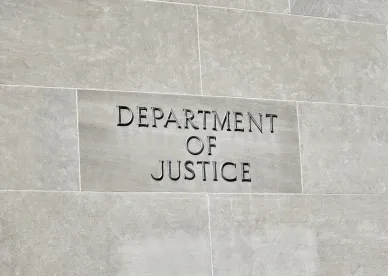Earlier this summer, Ethan P. Davis, Principal Deputy Assistant Attorney General for the Civil Division of the U.S. Department of Justice (DOJ) delivered remarks addressing DOJ’s top priorities for enforcement actions related to COVID-19 and indicating that DOJ plans to “vigorously pursue fraud and other illegal activity.”[1] As discussed below, Davis’s remarks not only highlighted principles that will guide enforcement efforts of the Civil Fraud Section under the False Claims Act (FCA) and of the Consumer Protection Branch (CPB) under the Food, Drug, and Cosmetic Act (FDCA) and the Controlled Substances Act (CSA) in response to the COVID-19 public health emergency (PHE), they also provide an indication of how DOJ might approach enforcement over the next few years.
DOJ’S KEY CONSIDERATIONS & ENFORCEMENT STRATEGY FOR COVID-19
Davis highlighted two key principles that would drive DOJ’s COVID-related enforcement efforts: the energetic use of “every enforcement tool available to prevent wrongdoers from exploiting the COVID-19 crisis” and a respect of the private sector’s critical role in ending the pandemic and restarting the economy.[2] Under that framework, DOJ plans to pursue fraud and other illegal activity under the FCA, which Davis characterizes as “one of the most effective weapons in [DOJ’s] arsenal.”[3]
However, as DOJ pursues FCA cases, it will also seek to affirmatively dismiss qui tam claims that DOJ finds meritless or that interfere with agency policy and programs.[4] DOJ also plans to collect certain information from qui tam relators regarding third-party litigation funders during relator interviews.[5] DOJ’s emphasis on qui tam cases—cases brought under the FCA by relators or whistleblowers—for COVID-related enforcement highlights the impact such matters have on DOJ’s enforcement agenda.[6]
-
DOJ will consider dismissing cases that involve regulatory overreach and are not otherwise in the interest of the United States.
Although Davis emphasized that the majority of qui tam cases would be allowed to proceed, in order to “weed out” cases that lack merit or that DOJ believes should not proceed, DOJ will consider dismissing cases that “involve regulatory overreach or are otherwise not in the interest of the United States.”[7] This is consistent with the principles reflected in the 2018 Granston Memo that instructed DOJ attorneys to consider “whether the government’s interests are served” when considering whether cases should proceed and listed considerations for seeking alternative grounds for dismissal of FCA cases.[8] Davis gave examples throughout his speech of actions DOJ might consider dismissing:
-
Cases based on immaterial or inadvertent mistakes, such as technical mistakes with paperwork
-
Cases based on honest misunderstandings of rules, terms, and conditions
-
Cases based on alleged deviations from non-binding guidance documents
-
Cases against entities that reasonably attempted to comply with guidance and “in good faith took advantage of the regulatory flexibilities granted by federal agencies in the time of crisis.”[9]
DOJ litigators have been advised to inform relators of the possibility of dismissal.[10] Additionally, qui tam suits based on behaviors temporarily permitted during the COVID-19 pandemic, particularly in circumstances in which agencies exercised discretion to waive or not enforce certain requirements, might
“fail as a matter of law for lack of materiality and knowledge.”[11]
-
DOJ will now include a series of questions during relator interviews to identify third-party litigation funders.
During each relator interview, DOJ has instructed line attorneys to ask a series of questions to identify whether the relator or their counsel has a third-party litigation funding agreement,[12] which is an agreement in which a third party—such as a commercial lender or a hedge fund—finances the cost of litigation in return for a portion of recoveries.[13] Under the new policy detailed in Davis’s speech, if a third-party funder is disclosed, DOJ will ask for the following:
-
the identity of the third-party litigation funder,
-
information regarding whether information of the allegations has been shared with the third party,
-
whether the relator or their counsel has a written agreement with the third party, and
-
whether the agreement between the relator or their counsel and the third party includes terms that entitles the third-party funder to exercise direct or indirect control over the relator’s litigation or settlement decisions.
Relators must inform DOJ of changes as the case proceeds through the course of litigation.[14] While Davis characterizes these changes as a “purely information-gathering exercise for the purpose of studying the issues,” the questions are in furtherance of DOJ’s ongoing efforts to uncover the potential negative impacts third-party litigation financing may have in qui tam actions. [15] The questions Davis referenced in his remarks reflect DOJ’s concerns with third-party litigation funding as expressed by Deputy Associate Attorney General Stephen Cox in a January 2020 speech.[16] Davis emphasized that DOJ particularly sought to evaluate the extent to which third-party litigation funders were behind qui tam cases DOJ investigates, litigates, and monitors; the extent of information sharing with third-party funders; and the amount of control third-party funders exercised over the litigation and settlement decisions.[17] While the Litigation Funding Transparency Act of 2019 has remained inactive since its introduction in February 2019 by Senator Grassley[18] and the 2018 proposal by the U.S. Court’s Advisory Committee on Civil Rights’ Multidistrict Litigation Subcommittee to require disclosure of third-party litigation funding remains under consideration,[19] DOJ’s plans to include this line of questioning potentially signals DOJ’s intention to take more concrete and significant steps to address third-party litigation funding in the future.
DOJ’S ENFORCEMENT PRIORITY AREAS
COVID-RELATED ENFORCEMENT
DOJ plans to “deploy the [FCA] against those who commit fraud related to the various COVID-19 stimulus programs,” particularly focusing on the Provider Relief Fund (PRF) and the Paycheck Protection Program (PPP), stimulus programs put into place by the Coronavirus Aid, Relief, and Economic Security Act (the “CARES Act”) that impose numerous enforceable requirements on recipients.[20] Davis stressed that the significant sums of money made available by these and other similar COVID-related stimulus programs presented significant opportunity for fraudulent activity.
-
DOJ will take enforcement action under the FCA for knowing violations of the Terms and Conditions of the PRF.
DOJ plans to target PRF recipients that knowingly violate the program’s Terms and Conditions. [21] The CARES Act appropriated $100 billion to the PRF to reimburse qualifying hospitals and providers for health care-related expenses or lost revenues attributable to COVID-19.[22] The Paycheck Protection Program and Health Care Enhancement Act appropriated an additional $75 billion to the PRF.[23] Recipients were required to attest to the Terms and Conditions of the PRF or were deemed to have accepted the Terms and Conditions if the recipient did not remit funds within 90 days of receipt.[24] The Terms and Conditions enumerate certain permitted uses of the grants, including to prevent, prepare for, and respond to COVID-19 and to reimburse health-care related expenses or revenues attributable to COVID-19.[25] The Terms and Conditions also prohibit certain uses of the funds, such as using the funds to reimburse expenses or losses that another source had the obligation to reimburse or that had already been reimbursed.[26] The PRF requires recipients to meet certain eligibility criteria, including having provided diagnoses, testing, or care for individuals with possible or actual cases of COVID-19.[27] While the Terms and Conditions specify noncompliance would be “grounds for the Secretary to recoup some or all of the payment made from the Relief Fund,”[28] Davis’s speech highlights that knowing violations may also subject entities to enforcement under the FCA.[29]
-
DOJ will continue its enforcement initiatives to identify and prosecute fraud related to the PPP under the FCA, particularly focusing on borrowers that falsely certify compliance.
The Civil Division has implemented initiatives to combat fraud in the PPP and will prioritize using the FCA to target PPP borrowers that falsely certify compliance with requirements of PPP loans.[30] The CARES Act created the PPP loan program to incentivize small businesses to keep employees on their payroll for eight weeks by making loans forgivable if used for certain expenses, such as “payroll, rent, mortgage interest, or utilities.”[31] For eligibility, the Small Business Administration (SBA) requires PPP borrowers to certify that the “economic uncertainty makes [the] loan request necessary to support the ongoing operations”[32] and to agree to certain program criteria.[33] The borrower must confirm compliance with these requirements when applying for loan forgiveness.[34] The amount of the loan forgiveness may be reduced if the number of full-time employees declines or if salaries and wages decrease.[35] While Davis emphasized that “if a company is eligible for a loan and submits certifications in good faith, that company will have nothing to fear from the Civil Division,” he also mentioned that DOJ would coordinate efforts with the Office of the Inspector General at the SBA to identify “potential wrongdoing that warrants investigation.”[36]
-
DOJ will also focus enforcement efforts on other stimulus and assistance programs.
DOJ will pursue FCA actions for fraud in other COVID-19 assistance programs when participants attempt to “skirt” requirements, similarly to DOJ’s efforts with the PPP.[37] For example, Davis specifically mentioned that DOJ would bring FCA actions against the borrowers and lenders violating eligibility and other covenants of the Federal Reserve’s Main Street New Loan Facility,[38] a loan program appropriated by the CARES Act for “small and medium-sized businesses that were in sound financial condition before the onset of the COVID-19 pandemic.”[39]
-
DOJ will target private equity investors that knowingly engaged in fraudulent activity related to the CARES Act.
DOJ’s enforcement actions would not be limited to entities themselves, but, as Davis emphasized, DOJ plans to take action against private equity firms that have taken “an active role in illegal conduct” of acquired companies that are recipients of CARES Act funds.[40] Similar to how acquisitions of companies within the health care industry generally open up private equity firms’ exposure to liability under the FCA, Davis stated, “Where a private equity firm knowingly engages in fraud related to the CARES Act, we will hold it accountable.”[41]
COVID-19 ENFORCEMENT FROM THE CPB
In addition to detailing FCA enforcement of COVID-related actions, Davis highlighted that the CPB of the Civil Division—which has “tripled in size since 2017”—will work with the U.S. Food and Drug Administration (FDA) and the U.S. Drug Enforcement Administration to enforce the FDCA and the CSA against pharmaceutical companies, medical device companies, and others in the life sciences space using civil and criminal enforcement “to safeguard consumers from COVID-related scams and unsafe products.”[42] CPB initiated action early in the PHE, targeting entities that offered fraudulent or unapproved products to consumers.[43] In furtherance of these efforts, Davis highlighted three areas that CPB plans to include in its scope of focus for COVID-related actions:
-
CPB will increase oversight over scammers and their facilitators within the “telecommunications, financial, and marketing industries,” as CPB anticipates scammers will attempt to shift their existing fraudulent schemes from targeting the Social Security Administration and Internal Revenue Service to COVID-related programs, such as the CARES Act stimulus programs.[44]
-
CPB will take action domestically and abroad to ensure that products comply with safety regulations, particularly focusing on drugs and active pharmaceutical ingredients.
-
CPB will also prioritize making sure that companies “ensure the integrity and accuracy of their clinical trials,” particularly as companies expedite developing drugs and medical devices in response to COVID-19.[45]
Davis stated that DOJ would work with FDA to ensure that enforcement efforts were consistent with regulatory flexibilities and emphasized “when a company seeks in good faith to operate within this regulatory framework, it should not have to fear first learning of government disapproval through a civil or criminal action.”[46]
BEYOND COVID-19: OTHER PRIORITIES OF THE CIVIL DIVISION
Despite the focus on COVID-related actions, Davis provided a reminder that DOJ will continue its broader enforcement activities, specifically targeting the six high-priority areas summarized below:
-
Enforcement in the Opioid Industry. The opioid crisis remains a key priority for enforcement actions. DOJ will continue using all civil and criminal tools available under the FCA, the FDCA, and the CSA—such as civil injunctive, forfeiture, and penalty provisions—to target the entire opioid drug distribution chain, including pharmaceutical companies, drug wholesalers, pharmacies, and physicians in enforcement actions responsive to the opioid crisis.[47]
-
Electronic Health Records. DOJ will pursue electronic health record companies under the FCA for activities that involve corruption and fraudulent activity related to the information provided to physicians, such as in a recent case in which Davis noted an electronic health record company accepted kickbacks for “using its software to promote opioid prescriptions to doctors.”[48]
-
Medicare Part C. DOJ expects to continue its FCA enforcement activities in the Medicare Advantage sphere, as Davis noted Medicare Advantage Organization plans currently cover an estimated one-third of Medicare beneficiaries.
-
Nursing Home and Fraud on the Elderly. DOJ’s National Nursing Home Initiative—launched in March—will continue coordinating investigations of nursing homes and will bring civil and criminal enforcement actions against nursing homes that “provide grossly substandard care to their residents.”[49]
-
Dietary Supplements. The CPB plans to increase resources dedicated to fraud enforcement in the dietary supplement industry, particularly due to the market’s comparatively low regulatory oversight and concern over imported dietary supplement ingredients.
-
Data Privacy. To address the growing threat of data misuse, the CPB will use the civil penalty provisions of the Federal Trade Commission Act to take enforcement action in the data privacy and security field and will further work in coordination with DOJ’s Antitrust Division and the Federal Trade Commission to hold companies and individuals accountable for breaking “the law in acquiring, storing, or using consumer data.”[50]
LOOKING FORWARD
Throughout his speech, Davis stressed that the Trump administration would focus efforts on “knowing violations of federal law that are material to the government’s payment decisions” and on cases “where the borrower knowingly failed to comply with material legal obligations and certifications.”[51] Further, Davis acknowledged compliance with the “thousands of rules, terms and conditions, and complicated guidance” would be a dizzying task under normal circumstances.”[52] Indeed, the complex and uncertain regulatory framework created by the PHE and the relief programs highlight the potential vulnerabilities well-intentioned entities may face as DOJ tries to identify and prosecute actual unscrupulous actors attempting to commit fraud during the COVID-19 pandemic. Businesses and individuals across the health care system—particularly recipients of stimulus funds—must diligently ensure compliance with regulatory flexibilities and requirements and should document such efforts, particularly since, as Davis noted, “these are still early days.”[53]
[1] U.S. Dep’t of Justice, Principal Deputy Assistant Attorney General Ethan P. Davis delivers remarks on the False Claims Act at the U.S. Chamber of Commerce’s Institute for Legal Reform (June 26, 2020), https://www.justice.gov/civil/speech/principal-deputy-assistant-attorney-general-ethan-p-davis-delivers-remarks-false-claims [hereinafter “Remarks from Assistant Att’y Gen. Davis”].
[2] Id
[3] Id. In 2019 alone, DOJ obtained over $3 billion in settlements and judgments from civil fraud and FCA cases, with over $2.5 billion—or 90 percent—generated from health care-related matters. Press Release, U.S. Dep’t of Justice, Justice Department Recovers over $3 Billion from False Claims Act Cases in Fiscal Year 2019 (Jan. 9, 2020), https://www.justice.gov/opa/pr/justice-department-recovers-over-3-billion-false-claims-act-cases-fiscal-year-2019; U.S. Dep’t of Justice, Fraud Statistics – Overview (Jan. 9, 2020), https://www.justice.gov/opa/press-release/file/1233201/download.
[4] Remarks from Assistant Att’y Gen. Davis, supra note 1.
[5] Id.
[6] Qui tam claims resulted in $1.9 billion in recoveries, or 73 percent of all health care-related FCA recoveries, in 2019. Press Release, U.S. Dep’t of Justice, Justice Department Recovers over $3 Billion from False Claims Act Cases in Fiscal Year 2019 (Jan. 9, 2020), https://www.justice.gov/opa/pr/justice-department-recovers-over-3-billion-false-claims-act-cases-fiscal-year-2019; U.S. Dep’t of Justice, Fraud Statistics – Overview (Jan. 9, 2020), https://www.justice.gov/opa/press-release/file/1233201/download.
[7] Remarks from Assistant Att’y Gen. Davis, supra note 1.
[8] Memorandum from Michael D. Granston, Director, Commercial Litigation Branch, Fraud Section, U.S. Dep’t of Justice, on Factors for Evaluating Dismissal Pursuant to 31 U.S.C. 3730(c)(2)(A) (Jan. 10, 2018), https://www.insidethefca.com/wp-content/uploads/sites/300/2018/12/Granston-Memo.pdf.
[9] Remarks from Assistant Att’y Gen. Davis, supra note 1.
[10] Id.
[11] Id.
[12] Id.
[13] Litigation Funding Transparency Act of 2019, S. 471 (2019); Press Release, Grassley Leads Lawmakers in Introducing Bill to Improve Transparency of Third Party Financing in Civil Litigation, Off. of Sen. Grassley (Feb. 13, 2019), https://www.grassley.senate.gov/news/news-releases/grassley-leads-lawmakers-introducing-bill-improve-transparency-third-party.
[14] Remarks from Assistant Att’y Gen. Davis, supra note 1.
[15] Id.
[16] U.S. Dep’t of Justice, Deputy Associate Attorney General Stephen Cox Provides Keynote Remarks at the 2020 Advanced Forum on False Claims and Qui Tam Enforcement (Jan. 27, 2020), https://www.justice.gov/opa/speech/deputy-associate-attorney-general-stephen-cox-provides-keynote-remarks-2020-advanced.
[17] Remarks from Assistant Att’y Gen. Davis, supra note 1.
[18] Litigation Funding Transparency Act of 2019, S. 471 (2019); Press Release, Grassley Leads Lawmakers in Introducing Bill to Improve Transparency of Third Party Financing in Civil Litigation, Off. of Sen. Grassley (Feb. 13, 2019), https://www.grassley.senate.gov/news/news-releases/grassley-leads-lawmakers-introducing-bill-improve-transparency-third-party.
[19] Advisory Committee on Civil Rules, Civil Rules Agenda Book (Nov. 1, 2018), https://www.uscourts.gov/sites/default/files/2018-11_civil_rules_agenda_book_0.pdf.
[20] Remarks from Assistant Att’y Gen. Davis, supra note 1.
[21] Id.
[22] The CARES Act, Pub. L. No. 116-136 (2020).
[23] Paycheck Protection Program and Health Care Enhancement Act, Pub. L. No. 116-139 (2020).
[24] U.S. Dep’t of Health & Human Servs., CARES Act Provider Relief Fund Frequently Asked Questions (June 19, 2020), https://www.hhs.gov/sites/default/files/provider-relief-fund-general-distribution-faqs.pdf [hereinafter “PRF FAQs”].
[25] Id.
[26] Dep’t of Health & Human Servs., Acceptance of Terms and Conditions (2020), https://www.hhs.gov/sites/default/files/terms-and-conditions-provider-relief-30-b.pdf.
[27] PRF FAQs, supra note 24.
[28] Dep’t of Health & Human Servs., Acceptance of Terms and Conditions (2020), https://www.hhs.gov/sites/default/files/terms-and-conditions-provider-relief-30-b.pdf.
[29] Remarks from Assistant Att’y Gen. Davis, supra note 1.
[30] Id.
[31] U.S. Dep’t of Treasury, Small Business Paycheck Protection Program (n.d.), https://home.treasury.gov/system/files/136/PPP%20–%20Overview.pdf.
[32] U.S. Small Business Admin., Paycheck Protection Program Borrower Application Form (Apr. 2020),
https://www.sba.gov/sites/default/files/2020-04/PPP-Borrower-Application-Form-Fillable.pdf.
[33] U.S. Small Business Admin., Paycheck Protection Program (n.d.), https://www.sba.gov/funding-programs/loans/coronavirus-relief-options/paycheck-protection-program.
[34] U.S. Small Business Admin., Paycheck Protection Program Loan Forgiveness Application (June 16, 2020), https://www.sba.gov/sites/default/files/2020-06/PPP%20Loan%20Forgiveness%20Application%20Instructions%20%28Revised%206.16.2020%29-508.pdf.
[35] U.S. Dep’t of Treasury, Small Business Paycheck Protection Program (n.d.), https://home.treasury.gov/system/files/136/PPP%20–%20Overview.pdf.
[36] Remarks from Assistant Att’y Gen. Davis, supra note 1.
[37] Id.
[38] Id.
[39] Fed. Reserve, Main Street New Loan Facility (June 8, 2020) https://www.federalreserve.gov/newsevents/pressreleases/files/monetary20200608a1.pdf; Bd. of Governors of the Fed. Reserve, Main Street Lending Program (July 8, 2020), https://www.federalreserve.gov/monetarypolicy/mainstreetlending.htm.
[40] Remarks from Assistant Att’y Gen. Davis, supra note 1.
[41] Id.
[42] Id.
[43] Id.
[44] Id.
[45] Id.
[46] Id.
[47] Id.
[48] Id.
[49] Id.
[50] Id.
[51] Id.
[52] Id.
[53] Id.





 />i
/>i

